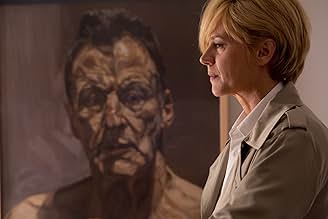AVALIAÇÃO DA IMDb
7,1/10
35 mil
SUA AVALIAÇÃO
Depois de um encontro casual, uma mulher de coração partido decide confrontar sua vida e os eventos mais importantes sobre sua filha encalhada.Depois de um encontro casual, uma mulher de coração partido decide confrontar sua vida e os eventos mais importantes sobre sua filha encalhada.Depois de um encontro casual, uma mulher de coração partido decide confrontar sua vida e os eventos mais importantes sobre sua filha encalhada.
- Direção
- Roteiristas
- Artistas
- Indicado para 1 prêmio BAFTA
- 14 vitórias e 62 indicações no total
Darío Grandinetti
- Lorenzo
- (as Dario Grandinetti)
Ramón Agirre
- Inocencio - portero
- (as Ramón Aguirre)
- Direção
- Roteiristas
- Elenco e equipe completos
- Produção, bilheteria e muito mais no IMDbPro
Avaliações em destaque
The screenplay of 'Julieta' is constructed with almost mathematical precision. In one of the first scenes, director Almodovar presents the question that is central to the rest of the film: what happened to the daughter of lead character Julieta? Most of the film consists of a long flashback, in which he slowly reveals the circumstances and events that led to her disappearance. At the end of the film, we are back in the present again, and we know everything there is to know.
It's a story Hitchcock would have been proud of: there is suspense, a beautiful blonde femme fatale, and psychological story elements. Not only the story, but also the cinematography is reminiscent of the master of suspense. Every scene is shot with extreme attention to lighting, colour and camera angle. Small details are the cherry on the cake: notice the way Almodovar introduces the birthday cake for the disappeared daughter: shot from above, as if it is a surreal work of art. Another example is the short sex scene in the train: the viewer sees only Julieta's head, but the rest of her body is reflected in the window pane behind her. As a director, Almodovar wants as much to be in control as Hitch. The result is a very beautiful film in every way - even the soundtrack is extremely tasteful.
'Julieta' is an elegantly filmed drama. There are no outrageous characters, exuberant scenes or other colourful elements we know from his earlier films. This is a restrained, precise and in every way immaculate piece of cinema.
It's a story Hitchcock would have been proud of: there is suspense, a beautiful blonde femme fatale, and psychological story elements. Not only the story, but also the cinematography is reminiscent of the master of suspense. Every scene is shot with extreme attention to lighting, colour and camera angle. Small details are the cherry on the cake: notice the way Almodovar introduces the birthday cake for the disappeared daughter: shot from above, as if it is a surreal work of art. Another example is the short sex scene in the train: the viewer sees only Julieta's head, but the rest of her body is reflected in the window pane behind her. As a director, Almodovar wants as much to be in control as Hitch. The result is a very beautiful film in every way - even the soundtrack is extremely tasteful.
'Julieta' is an elegantly filmed drama. There are no outrageous characters, exuberant scenes or other colourful elements we know from his earlier films. This is a restrained, precise and in every way immaculate piece of cinema.
In Madrid, the middle-aged Julieta (Emma Suárez) is packing her books to move to Portugal with her boyfriend Lorenzo (Dario Grandinetti). She goes shopping for the journey and stumbles upon Bea (Michelle Jenner), who was the best friend of her missing daughter Antia. They talk to each other and Bea discloses that Antia is married with three children. Julieta decides to stay in Madrid; breaks with Lorenzo; and rents an apartment in her former building, hoping that Antia contacts her. She decides to write the heartbreaking story of her life since she was a young woman and met her beloved future husband and Antia´s father Xoan (Daniel Grao) until the losses of Xoan and Antia.
"Julieta" is a dramatic romance by Pedro Almodóvar in a conventional style totally different from most of his previous works, since it is neither tacky nor aggressive to the Catholic Church; and using neither bright colors nor bizarre characters. Indeed it is a mature work disclosing the story of a middle-aged depressed woman that has her life affected for the loss of her beloved husband first and the last twelve years for the disappearance of her eighteen year-old daughter. The most important, the powerful drama never becomes a melodramatic soap-opera. The screenplay is very well-written with a perfect open end and magnificent cast. My vote is seven.
Title (Brazil): "Julieta"
"Julieta" is a dramatic romance by Pedro Almodóvar in a conventional style totally different from most of his previous works, since it is neither tacky nor aggressive to the Catholic Church; and using neither bright colors nor bizarre characters. Indeed it is a mature work disclosing the story of a middle-aged depressed woman that has her life affected for the loss of her beloved husband first and the last twelve years for the disappearance of her eighteen year-old daughter. The most important, the powerful drama never becomes a melodramatic soap-opera. The screenplay is very well-written with a perfect open end and magnificent cast. My vote is seven.
Title (Brazil): "Julieta"
Pedro Almodovar's 2oth feature film being an engaging and thought-provoking melodrama dealing with a middle age woman , Emma Suarez , living in Madrid with her sweetheart , Dario Grandinetti , about to move towards Lisboa . She , then , decides to stay only in Madrid to take on her existence and the most essential deeds about her missing daughter , Priscila Delgado . Julieta begins to record by writing her sad memories when she was a teen : Adriana Ugarte , and how she meets a fisher, Daniel Grao , and falls for him .
Interesting and agreeable melodrama by Almodovar with plenty of passions , tragedy , love , death and twists . Being based on 3 stories by Alice Munro titled : Chance, Soon and Silence from her collection Runaway . Including great performances from main cast as Emma Suárez and Adriana Ugarte . Attractive as well as sensational support cast with plenty of Almodovar familiar faces , such as : Dario Grandinetti, Rossi De Palma in her seventh collaboration , along with others as Daniel Grao , Imma Cuesta, Natalie Poza , Michelle Jenner , Susi Sánchez , Joaquin Notario and Pilar Castro . Sensitive and enjoyable soundtrack by Oscar Winner Alberto Iglesias , Almodovar regular. Colorful and evocative cinematography by cameraman Jean Claude Larrieu and a lot of frames contains the Red color.
La motion picture was well directed by Pedro Almodovar in his usual style, being produced by his brother Agustin Almodovar and their production company , El Deseo . This is Almodovar return to women's drama which he has not directed on since Volver . Almodovar is considered to be one of the best fimmakers of the film history . He has got a lot of hits with dramatic films as Talk to her , Volver , The flower of My secret , The sin I live in, Abrazos rotos , Carne Trémula, Tacones Lejanos , Ley Del Deseo , Que he hecho yo para merecer esto , Matador ! , but also has made comedies as Women on the edge of breakdown , Kika , Laberinto de pasiones , I am so excited and Pepi Lucia Bom. Rating : 7/0 . Better than average . The pic will appeal to Pedro Almodovar followers.
Interesting and agreeable melodrama by Almodovar with plenty of passions , tragedy , love , death and twists . Being based on 3 stories by Alice Munro titled : Chance, Soon and Silence from her collection Runaway . Including great performances from main cast as Emma Suárez and Adriana Ugarte . Attractive as well as sensational support cast with plenty of Almodovar familiar faces , such as : Dario Grandinetti, Rossi De Palma in her seventh collaboration , along with others as Daniel Grao , Imma Cuesta, Natalie Poza , Michelle Jenner , Susi Sánchez , Joaquin Notario and Pilar Castro . Sensitive and enjoyable soundtrack by Oscar Winner Alberto Iglesias , Almodovar regular. Colorful and evocative cinematography by cameraman Jean Claude Larrieu and a lot of frames contains the Red color.
La motion picture was well directed by Pedro Almodovar in his usual style, being produced by his brother Agustin Almodovar and their production company , El Deseo . This is Almodovar return to women's drama which he has not directed on since Volver . Almodovar is considered to be one of the best fimmakers of the film history . He has got a lot of hits with dramatic films as Talk to her , Volver , The flower of My secret , The sin I live in, Abrazos rotos , Carne Trémula, Tacones Lejanos , Ley Del Deseo , Que he hecho yo para merecer esto , Matador ! , but also has made comedies as Women on the edge of breakdown , Kika , Laberinto de pasiones , I am so excited and Pepi Lucia Bom. Rating : 7/0 . Better than average . The pic will appeal to Pedro Almodovar followers.
You may enjoy Julieta (2016) more if you know that it is a women's film from the melodrama genre and a story of pure emotion. While it is labelled a romance it is nothing like a romance and don't expect light entertainment or laughs as the film is devoid of humour. What is does have is an outpouring of quintessentially maternal guilt and self-absorbed loss that is palpable throughout the film. While critics may be divided, this is a beautiful film with a long aftertaste.
We meet the attractive widow Julieta just as she is packing to leave Madrid and move with her boyfriend to Portugal. Madrid is full of painful memories, the most intense of which is not seeing her daughter Antia for twelve years. A chance encounter with her daughter's former best friend opens an uncontrollable torrent of guilt which suddenly fills Julieta's life. Abandoning her boyfriend, she decides to stay in Madrid in case Antia ever looks for her. Unable to deal with her grief in any other way, she writes the story of her life as if she is talking to her absent daughter.
Julieta narrates the story in chapters that become extended flashbacks to her early romance with Antia's father, their lives together as a family and its eventual disintegration. What was once a life full of loving relationships becomes one of multiple losses even though Julieta herself bears little blame for the tragedies. Julieta is unaware how deeply her daughter was affected by what happened and is bewildered when Antia searches for spirituality at a Swiss retreat. Her sudden disappearance without explanation has left her mother with unresolved grief.
As each chapter unfolds we see the larger portrait of the mother and daughter relationship in all its dense complexity and destructive power. The narrative teasingly denies us knowledge of why Antia refuses all contact with her mother, and year after year Julieta mourns each passing birthday as if it was a funeral. The storytelling intensity is sustained by finely nuanced acting from the two stars who play the younger and older Julieta, and those who play Antia at different ages. The camera-work has a melancholic sensitivity that resonates with the Spanish landscapes and urban settings, and while the story unwinds slowly, to tell it more quickly would lose depth and meaning. Julieta is a darkly sensitive essay about the universal emotion of maternal guilt and its melancholy lifts like a rising fog with a masterfully ambivalent ending that soars.
We meet the attractive widow Julieta just as she is packing to leave Madrid and move with her boyfriend to Portugal. Madrid is full of painful memories, the most intense of which is not seeing her daughter Antia for twelve years. A chance encounter with her daughter's former best friend opens an uncontrollable torrent of guilt which suddenly fills Julieta's life. Abandoning her boyfriend, she decides to stay in Madrid in case Antia ever looks for her. Unable to deal with her grief in any other way, she writes the story of her life as if she is talking to her absent daughter.
Julieta narrates the story in chapters that become extended flashbacks to her early romance with Antia's father, their lives together as a family and its eventual disintegration. What was once a life full of loving relationships becomes one of multiple losses even though Julieta herself bears little blame for the tragedies. Julieta is unaware how deeply her daughter was affected by what happened and is bewildered when Antia searches for spirituality at a Swiss retreat. Her sudden disappearance without explanation has left her mother with unresolved grief.
As each chapter unfolds we see the larger portrait of the mother and daughter relationship in all its dense complexity and destructive power. The narrative teasingly denies us knowledge of why Antia refuses all contact with her mother, and year after year Julieta mourns each passing birthday as if it was a funeral. The storytelling intensity is sustained by finely nuanced acting from the two stars who play the younger and older Julieta, and those who play Antia at different ages. The camera-work has a melancholic sensitivity that resonates with the Spanish landscapes and urban settings, and while the story unwinds slowly, to tell it more quickly would lose depth and meaning. Julieta is a darkly sensitive essay about the universal emotion of maternal guilt and its melancholy lifts like a rising fog with a masterfully ambivalent ending that soars.
My interest in Almodovar is rather muted. He doesn't excel in any of the ways of presenting the world that really matter to me but he does several things more than well, so every so often I visit. There is the desire to submerge ourselves in fiction, lose ourselves to self in order to wake to a fabric that extends from self. That's Talk to Her for me.
But like Woody Allen or the Coens, he has consistently worked for so long on the same motifs that coming to him is also a matter of is he particularly inspired that day. I'm pleased to say he is.
In the individual pieces of cinematic craft, this is not particularly exceptional. If you're heavily inclined to how story resolves drama, you will see here something that simply trails off near the end. The symbolic motifs greet us upfront; a deer in slow-motion, tumultuous sea out the window. His bright reds on walls and the like are not something I can get excited about, in this or any film.
But he is inspired today on the fundamental matter of self passing through self. He manages to do this with just a few strands of narrative. There is the young woman who was on her way to all life ahead of her that night on the train, who finds herself yanked by unexpected passion. There is the house of passion in the small fishing village, eerily explored with Hitchcock hues. And there is bewildering loss as she wanders away a widowed mother.
Above all I love here the sense of transition. Almodovar does so well - his actress helps - in spinning narrative to explore tragedy. He says enough about the jittery urge for adventure as a story we throw ourselves in so that we can infer more fleeting illusion around the crushing melodrama about life breaking down. She's not just this grieving woman that another film, say, in the realist format would have simply followed around Madrid; we're privy to all this richness of her young self having set off in search. Things couldn't have only worked this way for her, it's important to see; but sometimes they do, sometimes setting out for open sea means finding yourself marooned on an island, nothing right or wrong.
And Almodovar is ineluctably Spanish, meaning Catholic; so communion with the fleeting, transcendent stuff must take place firmly within ritual, in his case (just like Ruiz before) fiction. The whole is narrated by an author writing the story down as she waits in her apartment, shifting us forward and back. It speaks about the imaginative mind being burdened by the narratives of memory. For Almodovar, there is merit in the effort. Had she not stayed behind to write, she would have missed the letter. Even more pertinently for me, there is a bedridden mother (a mirrored woman) who is allowed to languish in her room, written off as an invalid. But when her daughter comes to visit, the recognition nourishes her back to her feet.
But like Woody Allen or the Coens, he has consistently worked for so long on the same motifs that coming to him is also a matter of is he particularly inspired that day. I'm pleased to say he is.
In the individual pieces of cinematic craft, this is not particularly exceptional. If you're heavily inclined to how story resolves drama, you will see here something that simply trails off near the end. The symbolic motifs greet us upfront; a deer in slow-motion, tumultuous sea out the window. His bright reds on walls and the like are not something I can get excited about, in this or any film.
But he is inspired today on the fundamental matter of self passing through self. He manages to do this with just a few strands of narrative. There is the young woman who was on her way to all life ahead of her that night on the train, who finds herself yanked by unexpected passion. There is the house of passion in the small fishing village, eerily explored with Hitchcock hues. And there is bewildering loss as she wanders away a widowed mother.
Above all I love here the sense of transition. Almodovar does so well - his actress helps - in spinning narrative to explore tragedy. He says enough about the jittery urge for adventure as a story we throw ourselves in so that we can infer more fleeting illusion around the crushing melodrama about life breaking down. She's not just this grieving woman that another film, say, in the realist format would have simply followed around Madrid; we're privy to all this richness of her young self having set off in search. Things couldn't have only worked this way for her, it's important to see; but sometimes they do, sometimes setting out for open sea means finding yourself marooned on an island, nothing right or wrong.
And Almodovar is ineluctably Spanish, meaning Catholic; so communion with the fleeting, transcendent stuff must take place firmly within ritual, in his case (just like Ruiz before) fiction. The whole is narrated by an author writing the story down as she waits in her apartment, shifting us forward and back. It speaks about the imaginative mind being burdened by the narratives of memory. For Almodovar, there is merit in the effort. Had she not stayed behind to write, she would have missed the letter. Even more pertinently for me, there is a bedridden mother (a mirrored woman) who is allowed to languish in her room, written off as an invalid. But when her daughter comes to visit, the recognition nourishes her back to her feet.
Você sabia?
- CuriosidadesAll the sculptures made by Ava are in reality made by Miquel Navarro, a well known artist from Spain.
- Erros de gravaçãoWhen the train does an emergency brake and luggage and people are being tossed all over the place a coffee cup and coffee pot in front of the main character remains undisturbed.
- ConexõesFeatured in Fandor: The High Art of Pedro Almodóvar's Camp (2018)
- Trilhas sonorasPlaying the Piano 2009
Written and Performed by Ryuichi Sakamoto
Principais escolhas
Faça login para avaliar e ver a lista de recomendações personalizadas
- How long is Julieta?Fornecido pela Alexa
Detalhes
Bilheteria
- Orçamento
- € 1.350.000 (estimativa)
- Faturamento bruto nos EUA e Canadá
- US$ 1.490.948
- Fim de semana de estreia nos EUA e Canadá
- US$ 64.044
- 25 de dez. de 2016
- Faturamento bruto mundial
- US$ 22.521.904
- Tempo de duração1 hora 39 minutos
- Cor
- Mixagem de som
- Proporção
- 1.85 : 1
Contribua para esta página
Sugerir uma alteração ou adicionar conteúdo ausente


![Assistir a Tráiler [OV]](https://m.media-amazon.com/images/M/MV5BYTZiMjRjZWMtM2NmMC00MTNmLWJhMTAtMmJkYjgxNjk3YWVhXkEyXkFqcGdeQXRodW1ibmFpbC1pbml0aWFsaXplcg@@._V1_QL75_UX500_CR0)






































